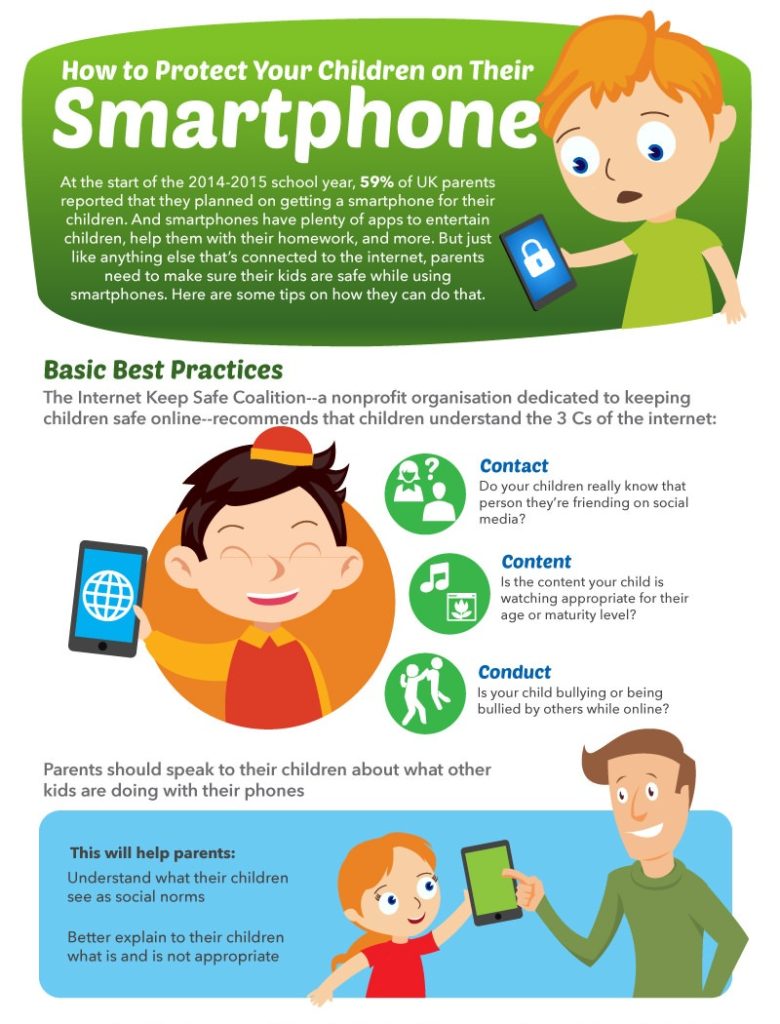Protecting Your Children on Their Smartphone
Posted by Karah
For more information go to: https://www.tigermobiles.com/2015/05/how-to-protect-your-children-on-their-smartphone/
Posted in Just For Parents | Tagged Camp Crestridge for Girls, Camp Ridgecrest for Boys, parent resources, Parenting Teenagers, Ridgecrest Summer Camps | Leave a reply
Protecting Children’s Privacy Online
Posted by Karah Back in 2009 when Ridgecrest Summer Camps first began our Parent Blog, we posted about several ways you can create a cybersafe home. “This generation of parents is the first to face the challenge of helping our children make the most of their virtual space while keeping them safe in it.” (1) This rings more truly today than it did 8 years ago.
Back in 2009 when Ridgecrest Summer Camps first began our Parent Blog, we posted about several ways you can create a cybersafe home. “This generation of parents is the first to face the challenge of helping our children make the most of their virtual space while keeping them safe in it.” (1) This rings more truly today than it did 8 years ago.
The world has rapidly changed since then, and the dangers of online activity apply to more than just what your child searches on the internet. Online bullying, predators, and in-app advertisements are one click away from accessing information about internet users, especially children. Comparitech is an online blog that has recently posted steps you can take to block unwanted contact and advertisements from the websites and apps your child might use. Since we at Ridgecrest Summer Camps want to continue partnering with you the parent as you invest in your child, we are pointing you to some professionals regarding these touchy issues.
This link will take you to a very informative blog posted by Comparitech in 2016. This guide is slightly different because it tackles the issue of online privacy which can span not only protecting children from online predators but also things like preventing identity theft (the FTC estimates that close to 3.5m children have had their SS number stolen for example) and ways to minimize the risks of the household computer becoming compromised. Take the time to read this blog and hear what the professionals have to say.
“Protecting Children’s Privacy Online- A Guide for Parents, Carers, and Educators”
https://www.comparitech.com/blog/vpn-privacy/protecting-childrens-privacy/
Feel free to refresh your memory on other ways to create a cybersafe home that can still be applicable today. To access the blog posted by Ridgecrest Summer Camps in 2009, click the link here!http://parentsblog.ridgecrestcamps.com/tag/cybersafe-home/
(1) http://parentsblog.ridgecrestcamps.com/tag/cybersafe-home/
Posted in Just For Parents | Tagged Camp Crestridge for Girls, Camp Ridgecrest for Boys, internet safety, parent resources, Parenting Teenagers, Privacy Protection, Ridgecrest Summer Camps | Leave a reply
Why Kids Flourish at Camp
Posted by Phil Campers often describe camp as their “happy place”” or “the best two weeks” of their year. And, from my own observation, I’ve seen that kids and the counselors who work with them are obviously happy at camp. They smile a lot. They look relaxed. There’s a lot of laughter. So many fun things happen at camp every day that it’s no surprise it’s such a happy place for kids.
Campers often describe camp as their “happy place”” or “the best two weeks” of their year. And, from my own observation, I’ve seen that kids and the counselors who work with them are obviously happy at camp. They smile a lot. They look relaxed. There’s a lot of laughter. So many fun things happen at camp every day that it’s no surprise it’s such a happy place for kids.
Recently I’ve read several books about the science behind happiness and the research that’s being done to determine the specific elements that cause people to “flourish” in life. (See my reading list below.)
Traditionally, psychologists have focused on studying psychological diseases – depression, anxiety, eating disorders, etc. – and their cures. But led by Martin Seligman (University of Pennsylvania), a new breed of psychologists called Positive Psychologists have, for the past decade, been studying the positive side of people. They ask not what is wrong with people, but what is right. They research what makes us do well in life and the reasons why some people thrive and find success and happiness in life.
Originally, Seligman had a theory of “happiness” outlined in his book Authentic Happiness, but he moved away from only using the word “happiness” to a new theory that focuses instead on well-being or “flourishing.” Seligman determined that it’s inaccurate to use the term “happiness,” as some people simply don’t have the personality to appear outwardly happy to others, even when they are doing quite well in life. I’m an extrovert who smiles a lot, so, objectively, people would probably say I’m pretty high on the happy scale. But how do we account for an introvert who doesn’t show a lot or emotion or display the outward symptoms that we equate with happiness? He may not smile a lot or appear outwardly happy, but, Seligman contends, he could still be flourishing. So, instead of using a one-dimensional definition that’s dependent on momentary emotions and personality traits, Seligman developed a more thorough theory of well-being that moved beyond his original happiness theory.
Seligman’s uses the acronym PERMA to define his theory and the five measurable elements he has determined lead to well-being. As I read about each pillar of PERMA in Seligman’s book, Flourish: A Visionary New Understanding of Happiness and Well-being, I kept having “ah-ha” moments. “This happens at camp!” I would think. “And this, too!” In fact, as I read, I determined that ALL of the elements of flourishing that Seligman describes happen at camp. According to Seligman, “No one element defines well-being, but each contributes to it.”
I’ve always been sucked in by inspirational quotes and quick sounds bites about how camp contributes to happiness, but I love knowing the science behind why kids flourish at camp.
PERMA at Camp… Read more… from Sunshine Parenting…
Posted in Just For Parents | Tagged Camp Crestridge, Camp Ridgecrest, parent articles, parent resources, parenting, Ridgecrest Summer Camps, summer camp | Leave a reply
Top Ten Mistakes Christian Parents of Teens Make
Posted by Phila post from Jeff Strong’s blog meredisciple.com
 It might be difficult for some parents to read through, but here’s a top ten list that I’ve been wanting to write for a while. Over the next several days I’ll be expanding on each of these in succession, but for now, here is my top ten mistakes Christian parents of teens make:
It might be difficult for some parents to read through, but here’s a top ten list that I’ve been wanting to write for a while. Over the next several days I’ll be expanding on each of these in succession, but for now, here is my top ten mistakes Christian parents of teens make:
10. Not spending time with your teen.
A lot of parents make the mistake of not spending time with their teens because they assume their teens don’t want to spend time with them! While that’s true in some contexts, teens still want and need “chunks” of one-on-one time with parents. Despite the fact that teens are transitioning into more independence and often carry a “I don’t need/want you around” attitude, they are longing for the securing and grounding that comes from consistent quality time.
Going for walks together, grabbing a coffee in order to “catch up,” going to the movies together, etc., all all simple investments that teens secretly want and look forward to. When you don’t carve out time to spend with your teen, you’re communicating that you’re not interested in them, and they internalize that message, consciously or unconsciously.
9. Letting your teen’s activities take top priority for your family.
The number of parents who wrap their lives/schedules around their teen’s activities is mind-boggling to me. I honestly just don’t get it. I know many parents want to provide their children with experiences and opportunities they never had growing up, but something’s gone wrong with our understanding of family and parenting when our teen’s wants/”needs” are allowed to overwhelm the family’s day-to-day routines.
Parents need to prioritize investing in their relationship with God (individually and as a couple), themselves and each other, but sadly all of these are often neglected in the name of “helping the kids get ahead.” “Don’t let the youth sports cartel run your life,” says Jen singer, author of You’re A Good Mom (and Your Kids Aren’t So Bad Either). I can’t think of many good reasons why families can’t limit teens to one major sport/extra-curricular activity per season. Not only will a frenetic schedule slowly grind down your entire family of time, you’ll be teaching your teen that “the good life” is a hyper-active one. That doesn’t align itself to Jesus’ teaching as it relates to the healthy rhythms of prayer, Sabbath, and down-time, all of which are critical to the larger Christian task of “seeking first the kingdom of God and His righteousness” (Matthew 6:33).
8. Spoiling your teen.
We are all tempted to think that loving our kids means doing all we can to ensure they have all the opportunities and things we didn’t have growing up. This is a terrible assumption to make. It leads to an enormous amount of self-important, petty, and ungrateful kids. A lot of the time parents are well-intentioned in our spoiling, but our continual stream of money and stuff causes teens to never be satisfied and always wanting more. Your teen doesn’t need another piece of crap, what he needs is time and attention from you (that’s one expression of spoiling that actually benefits your teen!).
There are two things that can really set you back in life if we get them too early:
a. Access to too much money.
b. Access to too many opportunities.
Parents need to recognize they’re doing their teens a disservice by spoiling them in either of these ways. Save the spoiling for the grandkids.
7. Permissive parenting.
“Whatever” — It’s not just for teens anymore! The devil-may-care ambivalence that once defined the teenage subculture has now taken root as parents shrug their shoulders, ask, “What can you do?” and let their teens “figure things out for themselves.” I think permissive parenting (i.e., providing little direction, limits, and consequences) is on the rise because many parents don’t know how to dialogue with and discipline their children. Maybe parents don’t have any limits of boundaries within their own life, so they don’t know how to communicate the value of these to their teen. Maybe it’s because they don’t want to, because their own self-esteem is too tied up in their child’s perception of them, and they couldn’t handle having their teen get angry at them for actually trying to parent. Maybe it’s because many parents feel so overwhelmed with their own issues, they can hardly think of pouring more energy into a (potentially) taxing struggle or point of contention.
Whatever the reason, permissive parenting is completely irreconcilable with a Christian worldview. I certainly do not advocate authoritarian parenting styles, but if we practice a permission parenting style we’re abdicating our God-given responsibility to provide guidance, nurture, limits, discipline and consequences to our teen (all of which actually help our teen flourish long-term).
6. Trying to be your teen’s best friend.
Your teen doesn’t need another friend (they have plenty); they need a parent. Even through their teens, your child needs a dependable, confident, godly authority figure in their life. As parents we are called to provide a relational context characterized by wisdom, protection, love, support, and empowerment. As Christian parents we’re called to bring God’s flourishing rule into our family’s life. That can’t happen if we’re busy trying to befriend our teen. Trying to be your teen’s friend actually cheats them out of having these things in their lives.
Sometimes parents think that a strong relationship with their teen means having a strong friendship—but there’s a fine line that shouldn’t be crossed. You should be friendly to your teen but you shouldn’t be your teen’s friend. They have lots of friends, they only have one or two parents—so be the parent your teen needs you to be.
5. Holding low expectations for your teen.
Johann Goethe once wrote, “Treat a man as he is and he will remain as he is. Treat as man as he can and should be, and he become as he can and should be.” All of us rise to the unconcious level of expectation we set for ourselves and perceive from others. During the teenage years, it’s especially important to slowly put to death the perception that your teen is still “a kid.” They are emerging leaders, and if you engage them as such, you will find that over time, they unconsciously take on this mantle for themselves. Yes, your teen can be moody, self-absorbed, irresponsible, etc., but your teen can also be brilliant, creative, selfless, and mature. Treating them like “kids” will reinforce the former; treating them as emerging leaders will reinforce the latter.
For an example of how the this difference in perspective plays out, I’ve written an article entitled “The Future of an Illusion” which is available as a free download from www.meredisciple.com (in the Free Downloads section). It specifically looks at my commitment to be involved in “emerging church ministry” as opposed to “youth ministry,” and it you may find some principles within it helpful.
4. Not prioritizing youth group/church involvement.
This one is one of my personal pet peeves (but not just because this is my professional gig). I simply do not understand parents who expect and want their kids to have a dynamic, flourishing faith, and yet don’t move heaven and earth to get them connected to both a youth group and local church.
I’m going to let everyone in on a little secret: no teenager can thrive in their faith without these two support mechanisms. I’m not saying a strong youth group and church community is all they need, but what I am saying that you can have everything else you think your teen needs, but without these two things, don’t expect to have a spiritually healthy and mature teen. Maybe there are teens out there who defy this claim, but honestly, I can’t think of one out of my own experience. As a parent, youth group and church involvement should be a non-negotiable part of your teen’s life, and that means they take priority over homework (do it the night before), sports, or any other extra-curricular commitments.
Don’t be the parent who is soft on these two commitments, but pushes their kid in schooling, sports, etc. In general, what you sow into determines what you reap; if you want to reap a teenager who has a genuine, flourishing faith, don’t expect that to happen if you’re ok with their commitment to youth group/church to be casual and half-hearted.
3. Outsourcing your teen’s spiritual formation.
While youth group and church is very important, another mistake I see Christian parents make is assuming them can completely outsource the spiritual development of their child to these two things. I see the same pattern when it comes to Christian education: parents sometimes choose to send their children/teens to Christian schools, because by doing so they think they’ve done their parental duty to raise their child in a godly way.
As a parent–and especially if you are a Christian yourself–YOU are THE key spiritual role model and mentor for your teen. And that isn’t “if you want to be” either–that’s the way it is. Ultimately, you are charged with teaching and modelling to your teen what follow Jesus means, and while church, youth groups, Christian schools can be a support to that end, they are only that: support mechanisms.
Read Deuteronomy 6 for an overview of what God expects from parents as it relates to the spiritual nurture and development of their children. (Hint: it’s doesn’t say, “Hand them off to the youth pastor and bring them to church on Sunday.”)
2. Not expressing genuine love and like to your teen.
It’s sad that I have to write this one at all, but I’m convinced very few Christian parents actually express genuine love and “like” to their teen. It can become easy for parents to only see how their teen is irresponsible, failing, immature, etc., and become a harping voice instead of an encouraging, empowering one.
Do you intentially set aside time to tell your teen how much you love and admire them? Do you write letters of encouragement to them? Do you have “date nights” where you spend time together and share with them the things you see in them that you are proud of?
Your teen won’t ask you for it, so don’t wait for an invitation. Everyday say something encouraging to your teen that builds them up (they get enough criticism as it is!). Pray everyday for them and ask God to help you become one of the core people in your teen’s life that He uses to affirm them.
1. Expecting your teen to have a devotion to God that you are not
cultivating within yourself.
When I talk to Christian parents, it’s obvious that they want their teen to have a thriving, dynamic, genuine, life-giving faith. What isn’t so clear, however, is whether that parent has one themselves. When it comes to the Christian faith, most of the time what we learn is caught and not taught. This means that even if you have the “right answers” as a parent, if you’re own spiritual walk with God is pathetic and stilted, your teen will unconciously follow suit. Every day you are teaching your teach (explicitely and implicitely) what discipleship to Jesus looks like “in the flesh.”
What are they catching from you? Are you cultivating a deep and mature relationship with God personally, or is your Christian parenting style a Christianized version of “do as I say, not as I do”?
While having a healthy and maturing discipleship walk as a parent does not guarantee your teen will follow in your footsteps, expecting your teen to have a maturing faith while you follow Jesus “from a distance” is an enormous mistake.
You are a Christian before you are a Christian parent (or any other role). Get real with God, share your own struggles and hypocrisy with your entire family, and maybe then God will begin to use your example in a positive and powerful way.
To order a copy of Mere Disciple: a spiritual guide for emerging leaders, click here.
Posted in Just For Parents | Tagged Camp Crestridge, Camp Ridgecrest, Just for Parents, parent resources, Parenting Teenagers, Ridgecrest Summer Camps | Leave a reply
Dads: Make Every Day Count
Posted by Phil Legendary football coach Vince Lombardi was well-known for a lot of things, most notably his passion for teamwork, commitment and success. Lombardi was driven to succeed, and he knew that winning required hard work and sacrifice.
Legendary football coach Vince Lombardi was well-known for a lot of things, most notably his passion for teamwork, commitment and success. Lombardi was driven to succeed, and he knew that winning required hard work and sacrifice.
“I firmly believe that any man’s finest hour,” Lombardi said, “the greatest fulfillment of all that he holds dear, is that moment when he has worked his heart out in a good cause and lies exhausted on the field of battle – victorious.”
As a father, my wife and children dominate the list of the things that I hold dear, and I will gladly lay exhausted on the field of battle for the cause of protecting and serving my family. I worked with at-risk kids for more than 20 years, and I’ve seen the positive role that dads play in the lives of their children. I’ve also witnessed firsthand the devastation that can occur when a child has no father figure in his or her life.
Assessing victory or defeat on the football field is relatively straightforward. It’s simply a matter of knowing the rules and how to keep score. Fatherhood is different. There is no off-season. No signing bonuses. No referees.
Yet victory is still possible.
One of the most effective parenting game plans is to simply take advantage of everyday opportunities to love our children and instill the right values in them. To be the best dad we can be is to make every day count.
So, where do we begin? We start with five key behaviors of a healthy, thriving family. These five behaviors demonstrate that small daily investments can make a big impact in a child’s life. They are prayer, laughter, time, conversation and dinner. Let’s look at each one:
Prayer: More than just praying for our children, prayer allows us to model for them the importance of taking our requests to a loving and gracious God. A few years ago, when I was without a job and our housing situation became unstable, our entire family sought the Lord together every day, and God provided for us in amazing ways. We continue to seek the Lord as a family (we have three young kids) to this day. Family prayer has drawn us closer to each other and to God.
Laughter: Modern science tells us that laughter has many benefits. It can increase blood flow, reduce stress and even help suppress pain. Laughter also has a profound impact on social interactions: Laughter connects us with others. Having fun as a family strengthens your relationships with your children and helps create positive memories. One of the regular ways we have fun is by watching our family videos. We make popcorn, laugh and reconnect as a family while we recall some of our favorite times together.
Time: We all have to choose how to occupy our limited free time, but you will never regret spending extra time with your children. (Watching TV together is not enough!) Ask yourself: Is the time we spend together as a family positive? Does it draw us closer together, or are we simply in the same home at the same time? In our home, Friday evenings are our regular family time. The kids look forward to it and each pick out a game for us to play. I also set aside one-on-one time with each of my kids. We call them “Date Nights With Dad,” which include activities like fishing, an evening at the park (with ice cream to follow, of course!) or a wagon ride around the neighborhood. Most of them involve little or no money – just lots of time together. Regular date nights also pave the way for a deeper and trusting relationship as our children grow.
Conversation: Talking is not always the same as conversing. A lot of family communication centers on superficial aspects of our lives such as managing daily schedules and whether or not we are keeping up with our regular duties (chores, homework, etc.). Do you ever set aside time to learn more about your children, to exchange ideas and opinions free from the regular interruptions of life? Can you name the “one thing” that gives meaning to your child’s life? Most parents can’t. Dads, if we don’t ask these questions – and actively listen to the answers – then we may never know our children’s fears and dreams.
Dinner: Researchers have found that family members who eat dinner together at least four times a week exhibit improved communication, healthier eating habits, higher grades and fewer problems with at-risk behaviors. The key to family dinners is keeping them free from distractions. Unplug from the world and pay attention to each other. One of the ways my family does this is by having everyone around the table share his or her “highs” (best thing of the day) and “lows” (low point of the day). Use dinnertime to engage in some of the other thriving family behaviors: time, prayer and conversation (and maybe even some laughter).
If your family is lacking in these behaviors, don’t despair. We all fall short as parents, but it’s never too late to start. No matter the ages of your children, begin today to take advantage of everyday interactions.
Maybe your children are grown and out of the house. You can still pray with them and for them, even if it’s over the phone. Invite them to dinner if they live nearby. Take the time to have a conversation about something other than the weather; maybe you’ll even get to share a few laughs.
It’s time to make every day count.
by Roy Baldwin To read the complete article, visit Focus on the Family…
Posted in Just For Parents | Tagged Camp Crestridge, Camp Ridgecrest, parent resources, Ridgecrest Summer Camps | Leave a reply
When Kids Lie
Posted by Phil Just yesterday morning, it was a Monday, we were making sure lunches were packed and teeth were brushed before Piper and I rushed out the door to take her to school. I was quickly walking into the kitchen when I stopped at the door and my eyes locked with the eyes of my youngest daughter, Lily. She was caught “red handed” pouring her breakfast into the trash can. While I fought back the smile, I just stood and stared at her. She knew right away that she was busted. Her plan wasn’t hard to figure out… quickly pour out my cereal, leave the empty bowl on the table, tell Mom and Dad that I had eaten it all. Peace of cake.
Just yesterday morning, it was a Monday, we were making sure lunches were packed and teeth were brushed before Piper and I rushed out the door to take her to school. I was quickly walking into the kitchen when I stopped at the door and my eyes locked with the eyes of my youngest daughter, Lily. She was caught “red handed” pouring her breakfast into the trash can. While I fought back the smile, I just stood and stared at her. She knew right away that she was busted. Her plan wasn’t hard to figure out… quickly pour out my cereal, leave the empty bowl on the table, tell Mom and Dad that I had eaten it all. Peace of cake.
I am aware, by the way, that this is a “little lie” and not a big deal. But somehow it was significant. This was one of the first times Lily had bold-faced-lied to me, or had at least planned to lie to me on purpose. And I couldn’t be happier how it played out. Catching your kids in a lie is precious, especially if we can catch them before they get too old, and it becomes one of their habits.
Plus, let’s be honest, kids beginning to lie to us isn’t all bad. They are starting to think for themselves…to make their own decisions… and to realize that Mommy and Daddy don’t know everything and don’t see everything. This is a good step to growing up!
So what do you do? How do you react to some of their first lies? Its a challenging question with lots of right answers, so here is what I did. I made a bid deal out of the lie. Who cares about the cereal, but the lie is the thing to focus on. There were 3 things I stressed when I sat on the floor to talk with Lily, wiping the tears from her cheeks.
1. In a very calm and loving tone I wanted Lily to know how sad it made me that she would lie to me. Oh, how it hurt my feelings that she wanted to tell me something that wasn’t true. I probably tried to say this same thing in 3 or 4 different ways to make sure she understood that we did not want her to lie…ever.
2. The second thing I wanted Lily to know was that she could always tell me anything. I would always listen and help her. She doesn’t need to be afraid to tell Mom or Dad the scary or hard things. We won’t turn our backs on her. We love her.
3. The last thing I wanted Lily to know was that not only do we love her, but Jesus loves her too, even more than we do! And Jesus can forgive her just like Mom and Dad.
Simple I know. Nothing ground breaking. But if we aren’t intentional, we end up telling our kids all kinds of stuff, especially in moments of frustration.
Do you have any comments or words of wisdom about when your kids lied to you? Any great stories? What about when kids get older? Comment below…
Phil Berry
Ridgecrest Summer Camps
Posted in Just For Parents | Tagged Camp Crestridge, Camp Ridgecrest, Just for Parents, kids lie, parent resources, Phil Berry, Ridgecrest Summer Camps | Leave a reply
Conversation Starter: Victorious
Posted by Phil Romans 7:20–8:9
Romans 7:20–8:9
Holy Spirit helps us live victoriously over sin
Conversation Starters
How can you keep this conversation going at home? Try bouncing some of these questions around at the dinner table, as you’re driving your kids to school or an activity, or even while you’re shopping together:
For Preschool
What is your favorite game to play with your friends? How do they help you win the game?
For Children
What are some things you like doing with other people? What makes that so special? How do you see God helping you make good choices about right and wrong? How can you lead your friends toward making wise choices?
For Students
Who is someone you think never struggles with internal battles with sin? Why? How does knowing Paul struggled with that conflict make you feel? How does knowing the Spirit can help you experience victory over sin make you feel?
Posted in Just For Parents | Tagged Camp Crestridge, Camp Ridgecrest, Conversation Starters, parent resources, Ridgercest Summer Camps, Romans 7:20–8:9 | Leave a reply
Answering Tough Questions from Kids about God
Posted by Phil “Hey, Mom?” my son said one day. “If killing is wrong, then why did God help David kill Goliath?” Whoa! My child was only 3 years old! I was not expecting questions like this for at least seven more years. Over the next few weeks, he asked even more questions, such as “If Jesus is God’s Son, then who is God’s wife?” and “So Jesus and God are kind of the same but kind of different. How does that work?
“Hey, Mom?” my son said one day. “If killing is wrong, then why did God help David kill Goliath?” Whoa! My child was only 3 years old! I was not expecting questions like this for at least seven more years. Over the next few weeks, he asked even more questions, such as “If Jesus is God’s Son, then who is God’s wife?” and “So Jesus and God are kind of the same but kind of different. How does that work?
Children are curious. Like it or not, you are going to be faced with tough questions from little seekers. At times, it can be overwhelming. After all, theologians and scholars have been debating the answers to some of these questions for centuries, so how can you be expected to know the answers and communicate them to children in a way that makes sense? The next time you find yourself stumped by a child’s question, keep the following guidelines in mind.
Encourage children to ask questions
When you feel you do not have the time or energy to get into difficult questions, it is tempting to reply with a quick, “That’s just the way it is” or “Because God said so.” But resist the temptation to be flippant or to blurt out responses that ultimately discourage children from asking questions. Children are genuinely curious about their world, and we need to create an environment that encourages them to seek the truth. When you do, you foster a lifelong desire to continue learning more about God.
Communicate at the child’s level
When answering a child’s tough questions about God, always take into consideration his age and maturity level. Use words and concepts that he can understand and that do not cause additional confusion. This may mean that at times you simplify an issue, such as the Trinity or Christ’s incarnation, to its most basic facts.
Do not be afraid to say you do not know the answer
Instead, join the child in discovering the answer to his questions. Feel free to say: “I’ll have to look that up and get back to you” or “I’m not sure how to answer that. Let’s find the answer together.” It is beneficial for children to see that you are not a supreme know-it-all but that you, too, are still learning about God and growing in your understanding of spiritual concepts.
Help an older child look up answers himself
Pointing children to resources available to them lays the foundation for a lifetime of seeking answers to the hard questions. Stock your bookshelf with a good Bible dictionary and commentary. Show the child how to look up the answer and discuss it with him.
Pray for spiritual understanding
A child’s understanding of spiritual matters is primarily influenced by the Holy Spirit. The Bible makes it clear that the concepts relating to God and His ways are not always easy to understand. Pray that the child’s spiritual eyes, as well as your own, will be opened to God’s truths.
My son is now 7 years old and the questions keep coming! But rather than feel frustrated, I look forward to hearing what he asks next, and I am excited to watch him learn even more about God.
by Katrina Baker on Tuesday, September 26, 2006
Posted in Just For Parents | Tagged Camp Crestridge, Camp Ridgecrest, Just for Parents, parent resources, Ridgecrest Summer Camps | Leave a reply
Video: Raising Radical Kids!
Posted by PhilParents! As we continue to partner with you as you raise your children, we are always on the lookout for solid resources and encouragement from some of the most godly fathers and sons that we know. We hope that you enjoy this 5 minute video with some really great ideas…
Posted in Just For Parents | Tagged Camp Crestridge, Camp Ridgecrest, LifeWay, parent resources, Parenting Teenagers, Raising Radical Kids!, Ridgecrest Summer Camps | Leave a reply
Traditions – at Camp… and at Home!
Posted by Phil At Ridgecrest Summer Camps, we have a lot of great traditions that have been ongoing since the 1930’s. One of them, at Camp Ridgecrest, is singing “Tell Me Why”. Our old brochures indicate that this has been happening for well over 80 years! At Crestridge, our Council of Progress ceremony has been ongoing since camp started in 1955!
At Ridgecrest Summer Camps, we have a lot of great traditions that have been ongoing since the 1930’s. One of them, at Camp Ridgecrest, is singing “Tell Me Why”. Our old brochures indicate that this has been happening for well over 80 years! At Crestridge, our Council of Progress ceremony has been ongoing since camp started in 1955!
Songs, ceremonies, and other traditions are an important part of camp… and also of families! They provide a familiarity, a “down home” feeling, a connectedness between the past and the present. Traditions help to make us more comfortable.
Are you making sure your family has traditions? I remember as a child, one of our family traditions was to go to the Dairy Queen every Sunday afternoon after Sunday lunch. We loved the soft serve ice cream, which you couldn’t get just anywhere at the time. I remember one time my dad letting us get Parfaits in the conical plastic glass cup, which I believe at the time cost 25 cents! That was quite a treat, as we usually were allowed only the ice cream cone which was 10 cents. Am I showing my age?
Another family tradition we had was praying before each meal around the table. You might think that everyone does that, but I don’t believe that happens as much these days as it used to.
Are you providing family traditions for your family? Maybe you visit the park or do a nature walk with your children on a given schedule. Maybe you set aside a time for family devotions. Maybe a tradition started when you were a child has carried over to your family now that you are the parent. Whatever your traditions might be, find some that work for your family, and keep those traditions. It will help your family stay better connected, both now and in the future!
Ron Springs
Camps Director
Ridgecrest Summer Camps
November 2012
Posted in Just For Parents | Tagged Camp Crestridge, Camp Ridgecrest, Jusr for Parents, parent resources, Ridgecrest Summer Camps, Ron Springs | Leave a reply